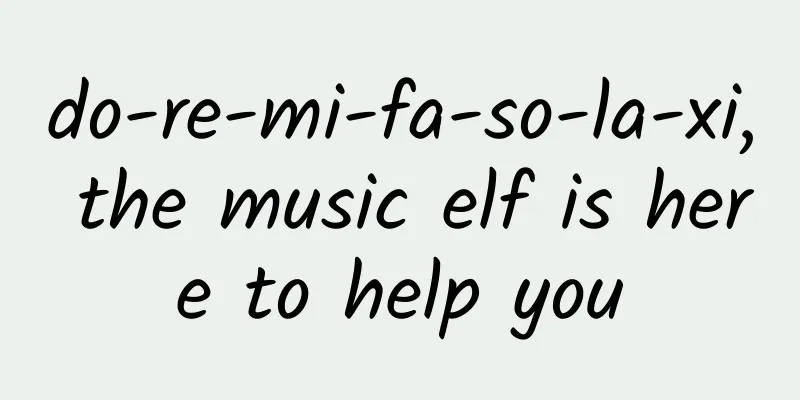do-re-mi-fa-so-la-xi, the music elf is here to help you

|
Music can be found everywhere in our daily life. It is so approachable that anyone can become a close friend of it. Nietzsche, a famous German philosopher, once said: "Without music, life is a mistake." Music, an invisible and intangible spirit, appears and disappears in our colorful life, creating endless beauty. What is Music Therapy? The American Music Therapy Association ( AMTA) defines music therapy as a method of using music or participating in music-related activities to improve physical, emotional, cognitive and social needs . Throughout the treatment process, music helps individuals achieve physiological, psychological and emotional integration in the treatment of diseases and disabilities, and stimulates the body's nerves and muscles through harmonious rhythms, making people feel happy. What patients are suitable for music therapy? What are the benefits of music therapy? 2) Regulate the autonomic nervous system of somatic motor function through the limbic system of the brain to promote physical and mental health . 3) Stimulate the hypothalamus and limbic system and other neural centers of the human brain to regulate emotions in a bidirectional manner . 4) It can act on the reticular formation of the brainstem and change the activity level of the central nervous system . 5) Coordinate the relationship between the functions of various parts of the cerebral cortex and the reticular formation of the brainstem, thereby improving the functions of individual nervous, endocrine and other systems . 6) It has certain regularity and frequency of change. When it is consistent with the vibration frequency and psychological rhythm inside the human body, it will cause harmonious resonance of muscles, brain waves, etc., thereby stimulating energy, coordinating functions, and promoting the healthy development of individuals' body and mind . Why is music therapy so effective for Parkinson's patients? For Parkinson's patients who have articulation problems such as a smaller voice, a monotonous tone, and short pronunciation, singing in the form of music therapy can help. Singing is actually a kind of prolonged speech, and it emphasizes rhythm, pitch changes, and breathing control. Through the practice of rhythm in singing, the comprehensibility and clarity of the patient's pronunciation are improved. With continuous practice, the patient's tone duration, voice volume, and swallowing control can be significantly improved. In addition, music therapy can also help improve Parkinson's patients' emotional disorders. Many Parkinson's patients are anxious and depressed, have no interest in anything, are not talkative, and have poor sleep quality. In our brain, there is an area called the "limbic system", which is the reaction center of sensation, emotion, and feeling. The dysfunction of this area may lead to depression. Appropriate music can fully mobilize and give play to the potential of this area, help patients self-regulate, and improve depression and anxiety. How to choose different music? Patients with depression can choose music that is exciting, rhythmic, vigorous, and pleasant , such as traditional folk music ("Good Luck Comes", "Happy Reunion"), which can transform negative and indifferent emotions into positive and enthusiastic emotions. If you are feeling nervous, you should choose quiet, soft, elegant, friendly, pleasant and relaxing music , such as saxophone music, yoga music, light music, etc. If you have sleep disorders, you can choose slow, quiet music with low melody , such as the guqin music "Three Variations on Plum Blossoms" and "Wild Geese Falling on the Plain Sand", which can regulate your heart rate and breathing, and have a calming and sleep-inducing effect. If the main purpose is to improve motor symptoms , you should choose some music with a strong sense of rhythm , such as "Athletes' March" and "The East is Red". Professionals can also provide a fixed-rhythm emotional music as background music for treatment. Music therapy is a mature, safe, easy-to-implement and low-cost rehabilitation treatment method that has been widely used in the rehabilitation of Parkinson's patients. Music therapy improves the patient's ability to connect with the surrounding environment and relieves the patient's motor and non-motor symptoms to a certain extent. It is of great significance for the care and care of Parkinson's patients in institutional and home environments. Author: Wei Meng, Liu Wenlan, Gao Caiping Unit: Shanghai Tongji University Affiliated Yangzhi Rehabilitation Hospital (Shanghai Sunshine Rehabilitation Center) Chief Judge: Zhai Hua (Shanghai Yangzhi Rehabilitation Hospital Affiliated to Tongji University, Vice Chairman of the Science Popularization Working Committee of the Chinese Rehabilitation Medicine Association) Editor: Jia Jing (Xinhua Hospital Affiliated to Shanghai Jiao Tong University School of Medicine) |
<<: Can acute bronchitis be prevented?
>>: Will pregnant women with long hair take away nutrition from the fetus?
Recommend
Can I have sex if my period is delayed?
When women and men reach a certain age, they will...
In which month of breastfeeding do you lose weight fastest?
For most women, pregnancy and childbirth is a lon...
Causes of Nipple Hypoplasia
There are many common physical diseases. When tre...
BRAF mutation! What happened to the little switch in the body? New breakthrough in lung cancer treatment →
Dear readers, hello! Today, we are going to talk ...
Chinese scholars have recently discovered that the "brake" for delaying aging is hidden in this type of food →
Aging is a complex, multi-stage, and gradual proc...
Why is there blood on my underwear?
There are many problems that often occur in the h...
Talk about delayed menstruation after ovulation bleeding
Ovulation bleeding is a problem that many women h...
How much is the KFC Forbidden City auspicious beast theme super value family bucket? How to buy it? What is the KFC Forbidden City joint family bucket?
As the New Year is getting closer, KFC and the Fo...
How to cure pelvic inflammatory disease? What is Traditional Chinese Medicine?
Pelvic inflammatory disease is a common gynecolog...
The normal amniotic fluid volume in a full-term pregnancy is
The amount of amniotic fluid of pregnant women wi...
What to do if the cervix is hard
Some female friends heard that a hard cervix is ...
How much radiation does the human body receive when eating a banana, taking a flight, or having a chest X-ray?
丨Author: Hao Zhixin, Peking Union Medical College ...
What to do when you have heart pain during pregnancy
Pregnancy can be said to be a very important thin...
Can I eat ginkgo nuts during menstruation?
Ginkgo nuts, also known as white nuts, are very n...
How much do you know about women's health and wellness?
In recent years, people have become quite keen on...




![[Health Lecture] "Bronchioloma of the lungs" - don't be too nervous](/upload/images/67f1d5647f53e.webp)




